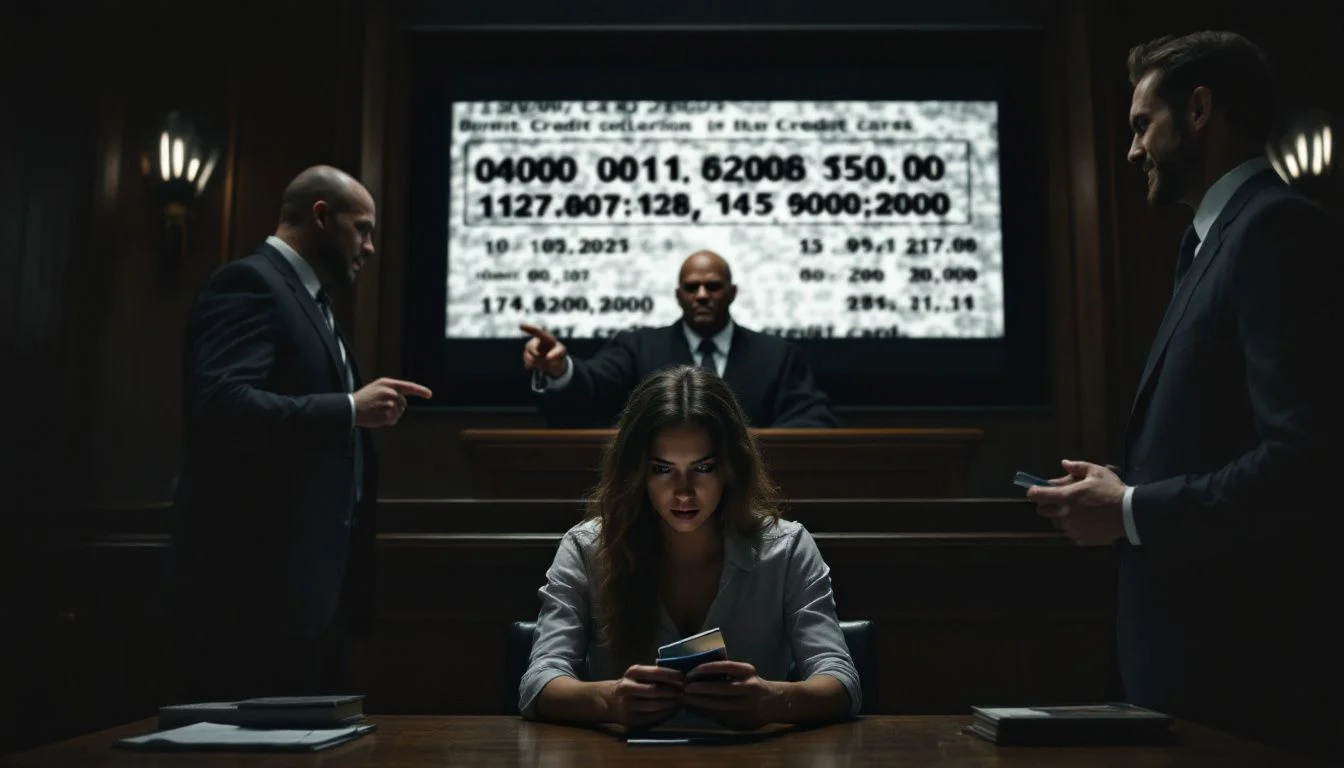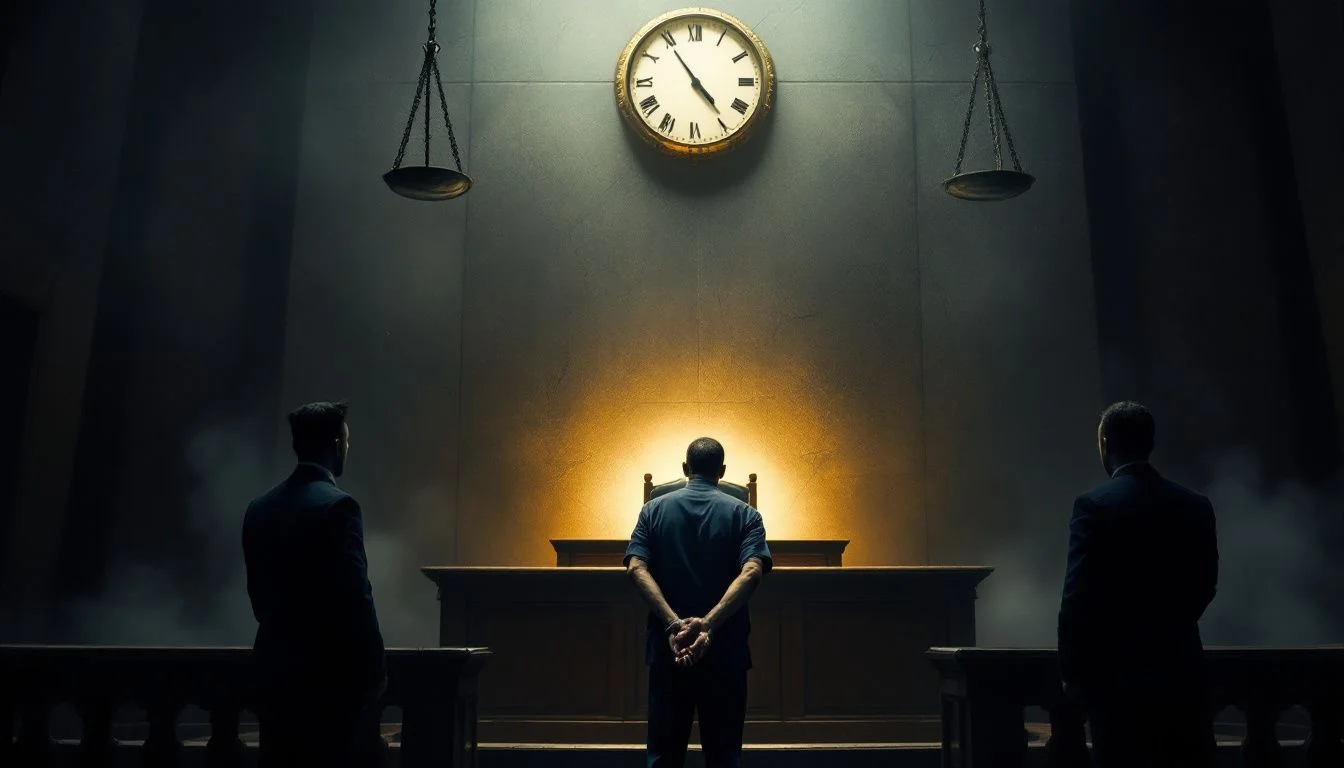Credit Card Fraud Defense
Facing a lawsuits for fraudulent credit card charges? A lawyer for credit card fraud can help you navigate the legal system and defend your rights. This article will explain what to expect and how a lawyer can assist you.
Key Takeaways
- Credit card fraud involves unauthorized use of another person’s account, leading to significant financial damage and legal complexities for victims.
- Various types of credit card fraud, such as application fraud and account takeover, require the victim’s prompt action and awareness to mitigate potential losses.
- Hiring an experienced credit card fraud lawyer is crucial for effective defense strategies and navigating the legal process following accusations of fraud.
Understanding Credit Card Fraud and Its Implications

Credit card fraud is defined as the unauthorized use of another cardholder’s account for financial gain. This can include actions like taking a credit or debit card with the intent to defraud or opening cards in others’ names. The implications of credit card fraud are far-reaching, causing significant damage to the victims’ finances and creditworthiness. Imagine the frustration of discovering that your credit report is marred by fraudulent activities, complicating your ability to purchase a home or qualify for loans.
Criminals often exploit lost or stolen credit cards to conduct fraud, typically for online purchases. In many cases, the fraudster doesn’t even need the physical card. Card-not-present fraud occurs when criminals use basic card information for transactions without having the card itself. These deceptive practices not only cause financial harm but also create a maze of legal and bureaucratic hurdles for the true cardholder.
Moreover, fraudsters can take over existing accounts by impersonating legitimate cardholders, changing addresses, and requesting new cards. They might also use skimmers, devices that capture credit card information from the magnetic strip to create counterfeit cards.
These sophisticated methods make it challenging for unsuspecting consumers and credit card companies to stay ahead of fraudulent activity, highlighting the importance of vigilance and prompt action.
Common Types of Credit Card Fraud Cases
Credit card fraud encompasses a variety of deceptive practices. One common method is application fraud, where thieves use stolen personal data to open new credit card accounts. Victims often remain unaware until they notice a sudden drop in their credit score or receive unexpected bills. Another prevalent form is account takeover fraud, where scammers impersonate cardholders to alter account credentials and gain control over the victim’s credit card account.
Skimming is another notorious technique used in credit card fraud cases. Fraudsters attach skimming devices to card readers at places like ATMs, gas stations, or even retail stores. These devices capture card information from the magnetic strip as the card is swiped, allowing criminals to create counterfeit cards. While the simplest form of fraud involves using a lost or stolen credit card, it often includes intercepting credit cards sent through the mail.
In addition to these, fraudsters may engage in double charging, where they process the same transaction multiple times. This fraudulent activity not only affects the true cardholder but also creates significant challenges for merchants and credit card companies. Understanding these various methods helps in recognizing suspicious activities and taking prompt action to mitigate potential losses.
Potential Penalties for Credit Card Fraud Conviction

The consequences of a credit card fraud conviction can be severe. In many jurisdictions, credit card fraud is categorized as a felony, leading to harsher penalties compared to misdemeanors. For instance, federal convictions for credit card fraud can result in up to 10 years of imprisonment and fines as high as $250,000. Such penalties underscore the seriousness of the crime and the importance of mounting a robust defense.
Convicted individuals may also be required to make restitution payments to their victims as part of their sentence. This means that beyond serving jail time or paying fines, they must compensate victims for their financial losses. Additional fees, such as forgery or possession of illegal credit card skimmers, can lead to even harsher penalties than the minimum requirements.
In cases where vulnerable individuals, like the elderly, are targeted, the charges can escalate to a third-degree felony, resulting in more severe penalties. The combination of jail time, hefty fines, and restitution payments highlights the critical need for experienced legal representation when facing credit card fraud charges.
Legal Defenses in Credit Card Fraud Cases

Facing credit card fraud charges can be daunting, but several legal defenses can challenge these accusations effectively. One key defense is demonstrating a lack of intention to commit fraud in a credit card fraud case. For instance, a defendant might argue that they reasonably believed they had permission to use the credit card. Proving this can significantly weaken the prosecution’s case.
Another viable defense is showing that the alleged fraudulent activity did not impact interstate or foreign commerce. This can be crucial in cases tried under federal crime law, where jurisdiction depends on the crime affecting commerce. It’s essential for the defense lawyer to thoroughly investigate the details of the case to identify such potential defenses.
In some instances, defendants can argue that they were victims of identity theft themselves, and the fraudulent activities were committed by someone else using their identity. These defenses require a thorough understanding of the law and a strategic approach, underlining the importance of an experienced defense attorney in navigating the complexities of credit card fraud cases.
Being Sued on a Fraudulent Account
In certain situations, individuals may find themselves sued by a lender on an account that a third party incurred by fraud. This is a common issue in places like Florida, where the lawsuit is not necessarily about committing fraud but about the liability on a fraudulent account. Having documentation that the fraudulent activity was reported to local law enforcement and federal agencies like the FCC can be incredibly helpful in such defenses.
When faced with such lawsuits, it’s crucial to remain calm and gather all relevant evidence. Documentation and timely reporting can often lead to a case dismissal, protecting the innocent party from unjust financial burdens.
This section underscores the importance of being proactive and prepared when dealing with fraudulent activities on credit accounts.
Importance of Hiring a Credit Card Fraud Lawyer

Hiring a credit card fraud lawyer is crucial for anyone facing credit card fraud charges. These defense attorneys specialize in handling state or federal credit card fraud cases and other theft charges. Their expertise can make a significant difference in the outcome of the case, providing the defendant with a strategic defense plan tailored to their specific situation.
A good credit card fraud lawyer takes a personal interest in each case, ensuring that their client understands the legal process and their options. They can educate clients on legal deadlines and available options, which is crucial in tight situations where time is of the essence. For instance, Ziegler Diamond Law Firm in Clearwater, FL, is known for its dedicated approach in legal proceedings, making them a valuable asset for those facing such charges.
If you notice unusual activity on your credit card statement, it’s essential to hire an experienced consumer fraud lawyer immediately. Early legal intervention can help mitigate potential damages and increase the chances of a favorable outcome.
What to Expect During a Credit Card Fraud Investigation

When you discover suspicious activity on your credit card, contacting the credit card company promptly is vital for launching an investigation. The investigation typically starts with the detection of suspicious activity, either through customer reports or automated alerts from monitoring systems. Banks and credit card companies gather various forms of evidence, such as transaction logs, account statements, and communication records, to get a clear picture of the fraudulent activity.
Forensic methods are often utilized to analyze the gathered data, helping investigators identify fraud patterns and discrepancies. Throughout the investigation, customers may be asked to provide additional information to clarify their claims and assist in evidence gathering. The timeline for investigations can vary widely, with simpler cases resolving in days, while more complex cases may take several months.
Depending on the findings, the investigation outcomes can lead to immediate refunds for unauthorized transactions. In cases where a broader fraud scheme is detected, legal authorities may get involved. Setting up a security alert with a credit bureau can also help monitor your credit report for signs of fraud during and after the investigation.
Free Consultation: How It Works
A free consultation offers potential clients the opportunity to discuss their case details and receive an initial assessment from a lawyer. These consultations can typically be scheduled through phone calls or online contact forms, making it convenient for clients to reach out. During the consultation, clients can learn about their legal options and get answers to their questions regarding credit card fraud.
To make the most of the consultation, clients should prepare any relevant documentation beforehand. Early legal advice from an attorney can significantly enhance the chances of a favorable outcome in credit card fraud cases. The consultation provides a platform for clients to understand the process and receive sound advice tailored to their situation.
Summary
In summary, understanding the nuances of credit card fraud, its types, and the potential penalties is crucial for anyone facing such charges. Legal defenses can vary, and having a skilled credit card fraud lawyer can make all the difference. The importance of prompt action, especially during an investigation, cannot be overstated.
Remember, if you find yourself dealing with credit card fraud charges, seeking a free consultation with an experienced lawyer can provide you with the knowledge and confidence to navigate the legal complexities. Stay vigilant and proactive to protect yourself from financial and legal repercussions.
Frequently Asked Questions
How do you prove credit card fraud?
To prove credit card fraud, monitor your account for unauthorized transactions and maintain detailed records of all communications with your credit card company. Additionally, filing a police report can provide an official record to support your claim.
What is credit card fraud?
Credit card fraud is the unauthorized use of another individual’s credit or debit card for financial gain, such as using stolen card information or opening accounts in someone else’s name. It poses significant risks to consumers and financial institutions alike.
What are the common types of credit card fraud?
Common types of credit card fraud include application fraud, account takeover fraud, and skimming. These methods involve exploiting card information to create counterfeit cards or gain unauthorized access to accounts.
What are the penalties for a credit card fraud conviction?
A conviction for credit card fraud can result in up to 10 years of imprisonment, fines reaching $250,000, and may also require restitution payments to victims. It is essential to recognize that additional charges can exacerbate these penalties.
How can a credit card fraud lawyer help me?
A credit card fraud lawyer can significantly enhance your chances of a favorable outcome by providing a tailored defense strategy, educating you on legal deadlines, and guiding you through the complexities of the legal process. Their expertise is essential in navigating such serious allegations effectively.


